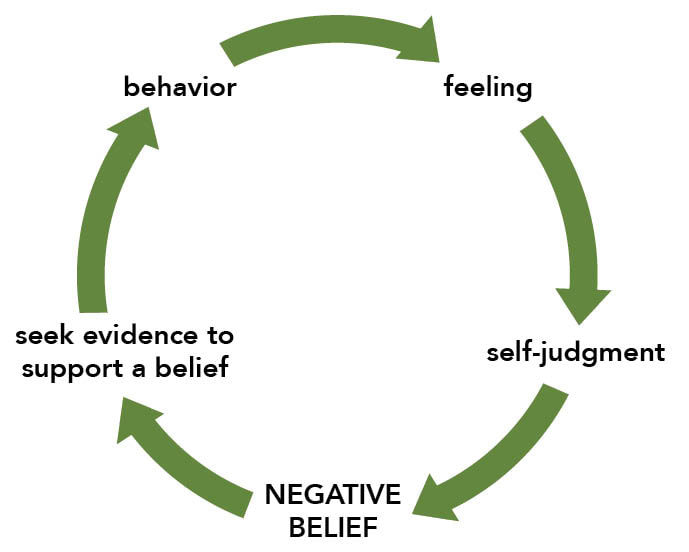loathing. There are other symptoms of self-loathing such as depression, eating disorders, and bullying behaviour. Self-loathing is the result of an accumulation of negative beliefs that we hold about ourselves such as “I’m bad”, “I’m not good enough”, “I don’t belong”. We all have them – some more than others. What you need to know is that negative beliefs form in early childhood and they drive subsequent behavior. By the time a child is six or seven they’ve already developed negative beliefs about themselves and have established patterns of behaviour that can lead to addiction or other mental health disorders. The good news is that once we become aware of them we can do something about them. So how do negative beliefs get started and how do they drive addictive behavior? Let me tell you how one of my daughter’s negative beliefs developed. My daughter took ballet lessons at Kerrisdale Community Centre when she was in Kindergarten. One day I dropped her off there as usual and decided to take a nap while she was there. I set an alarm but it didn’t go off. I woke up when the phone rang and it was the ballet teacher calling to tell me to come and pick up my daughter – class had ended half an hour earlier. By the time I got there I was nearly 45 minutes late and she was clearly upset and anxious. Children are ego centric in their world until they are six or seven and so she believed that it was somehow her fault that I was late and she made up right then and there that she was not good enough – that she was worthless and unlovable in fact – otherwise her mum would have picked her up on time. “I’m worthless” became a very stubborn negative belief for her. My daughter’s example illustrates two key points:
Here’s a diagram of how a negative belief cycle operates: When I was late picking her up from ballet, my daughter’s feeling was one of abandonment, and worry that I’d forgotten her. She judged herself as worthless and that became her core belief. Her belief that she was worthless prompted her to try to establish her worth by doing things perfectly – she became a perfectionist. Perfection is impossible to achieve so it is always a set up for failure and further evidence of worthlessness. Perfectionism often goes with eating disorders, so that was the first of her self-destructive behaviours to emerge. Smoking, and drinking provided lots of evidence of unworthiness, so the belief got stronger and stronger as her behavior got worse and worse. The things that she had to do to maintain these habits made the situation even worse.
Negative beliefs don’t always lead to substance abuse, but they do lead to feelings that are unpleasant. Substance abuse is a choice some people make to numb feelings that are too painful. A client reported becoming addicted to cocaine the very first time she tried it because the drug produced an incredible feeling of wellbeing – she experienced what it was like to be without emotional pain. If we want to change behaviour such as substance abuse, we have to tackle the cause of that behaviour which is the belief that triggered it. Healing a subconscious negative belief actually changes behaviour. So to summarize:
7 Comments
Lance Ball
11/26/2018 03:57:24 am
Any kind of negative addiction can make your life a hell. You have to understand your core pain and false self to discover the hidden roots of addiction. Your core torture might stay invisible to you. Your core negative belief may never allow you to feel good about yourself. Do you know- what the negative beliefs are? The negative beliefs are nothing but the reoccurring dreams of lack. So, you have to eliminate your limiting beliefs to avoid the possibility of getting addicted to alcohol or drug abuse- https://www.reginafasold.com/blog/how-to-defeat-your-self-limiting-beliefs/ .
Reply
8/17/2022 01:31:43 pm
Great story with an important point. When we spot these beliefs in others we can offer support. It's doubly tricky when we spot them in ourselves.
Reply
Anne Andrew
8/17/2022 04:15:23 pm
Thanks for your comment - we all have negative beliefs and the best thing a parent can do for their children is to tackle their own negative beliefs. That is how to clear the way for unconditional love! Having a happy parent is so helpful to a child particularly when they are struggling. https://www.anneandrew.com/blog/archives/08-2017
Reply
8/28/2022 09:28:56 pm
There are really hidden roots of addiction that we may never be aware of, and this article gives us the idea of that hidden roots which will be more helpful.
Reply
anne andrew
8/29/2022 11:51:14 am
Thank you friendly Housela!
Reply
Thanks for pointing out that it doesn't always lead to addiction when you have negative beliefs. However, it might really affect a person's way of thinking and decision-making. Hopefully, I can get help for teen addiction if ever my future kids will have that kind of problem, since there are things that we can't shield them from no matter how hard we try to protect them.
Reply
Leave a Reply. |
Author I know firsthand the emotional and financial costs of having a troubled teenager and I don’t want that to happen to you. That's why I wrote my book What They Don't Teach in Prenatal Class: The Key to Raising Trouble-Free Kids and Teens (available on Amazon). Archives
April 2022
Categories
All
|
get in touch
Email: [email protected] Tel: (1) 604 720 2776
Sign Up to my newsletter
Get information and articles about how to raise happy, mentally-healthy, and addiction-free kids!



 RSS Feed
RSS Feed